TUI Travel: Legal, Ethical, and Regulatory Framework Analysis
VerifiedAdded on 2023/01/19
|10
|2958
|33
Report
AI Summary
This report delves into the legal and ethical landscape of the travel and tourism sector, using TUI Travel as a case study. It begins by outlining the legal and regulatory framework, including key legislation such as the Tourism Act, Transport Act, and Package Travel Regulations. The report then examines surface, sea, and air transport laws concerning passenger carriage. It evaluates the impact of health, safety, and security legislation, including the Health and Safety at Work Act and Occupiers Liability Act, as well as data protection and vicarious liability. The report analyzes equality legislation, such as the Equality Act, Sex Discrimination Act, and Disability Discrimination Act, emphasizing the importance of non-discrimination. Contract and consumer protection legislation are explored, including the Consumer Protection Act and Trade Description Act. Finally, the report discusses ethical dilemmas faced by travel and tourism businesses, particularly concerning advertising and sustainable practices, including the need for accurate information and environmentally responsible operations.
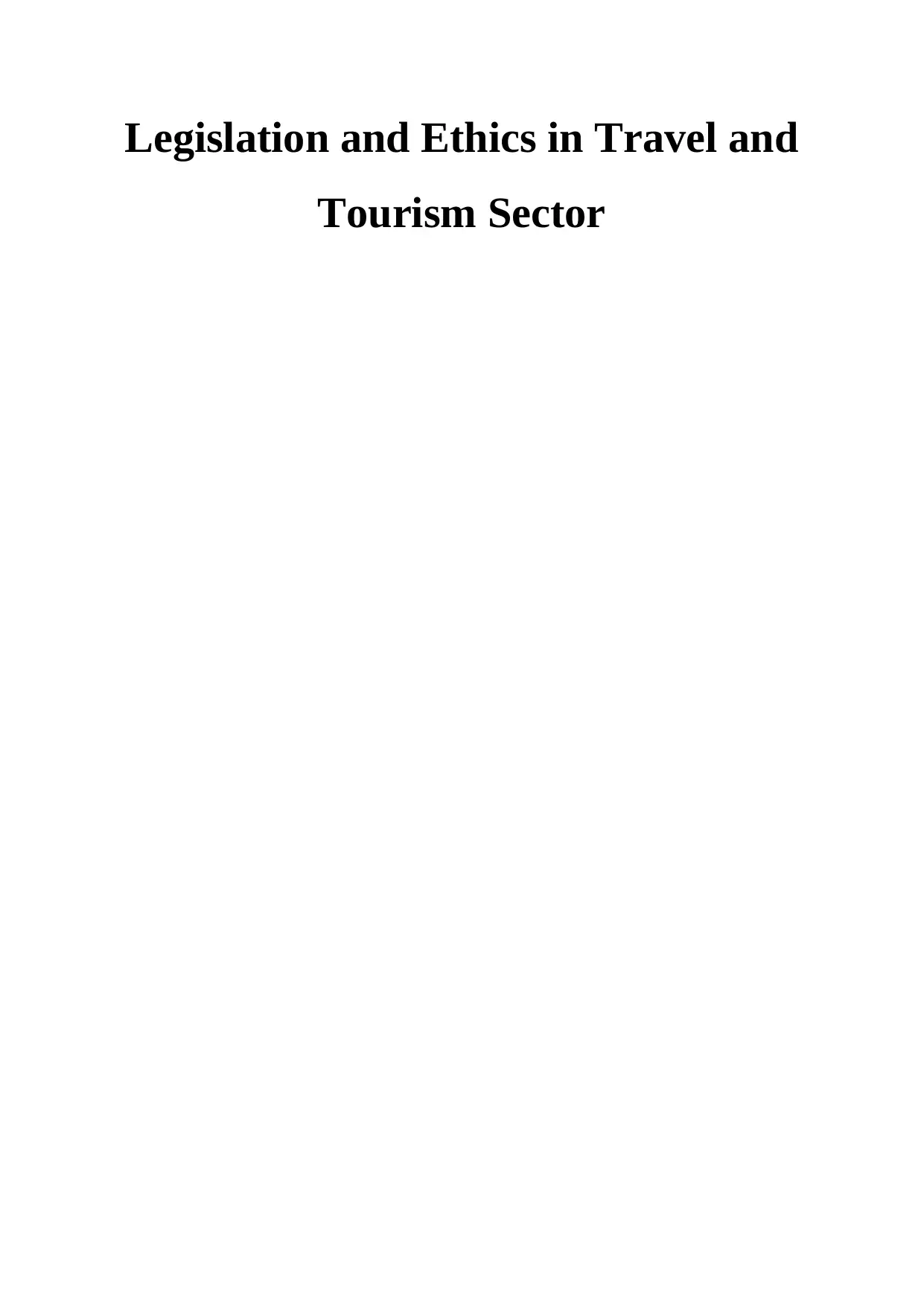
Legislation and Ethics in Travel and
Tourism Sector
Tourism Sector
Paraphrase This Document
Need a fresh take? Get an instant paraphrase of this document with our AI Paraphraser
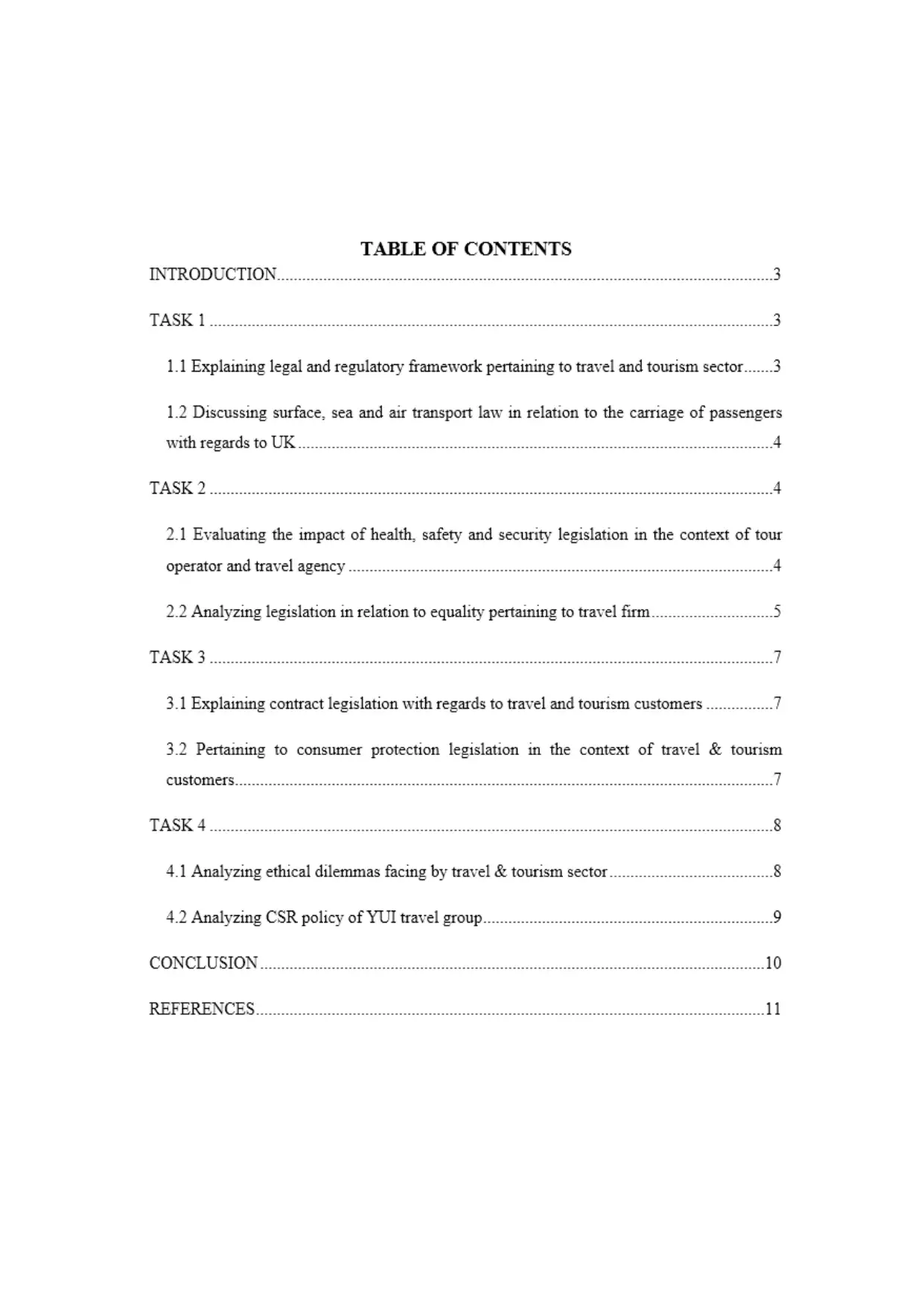
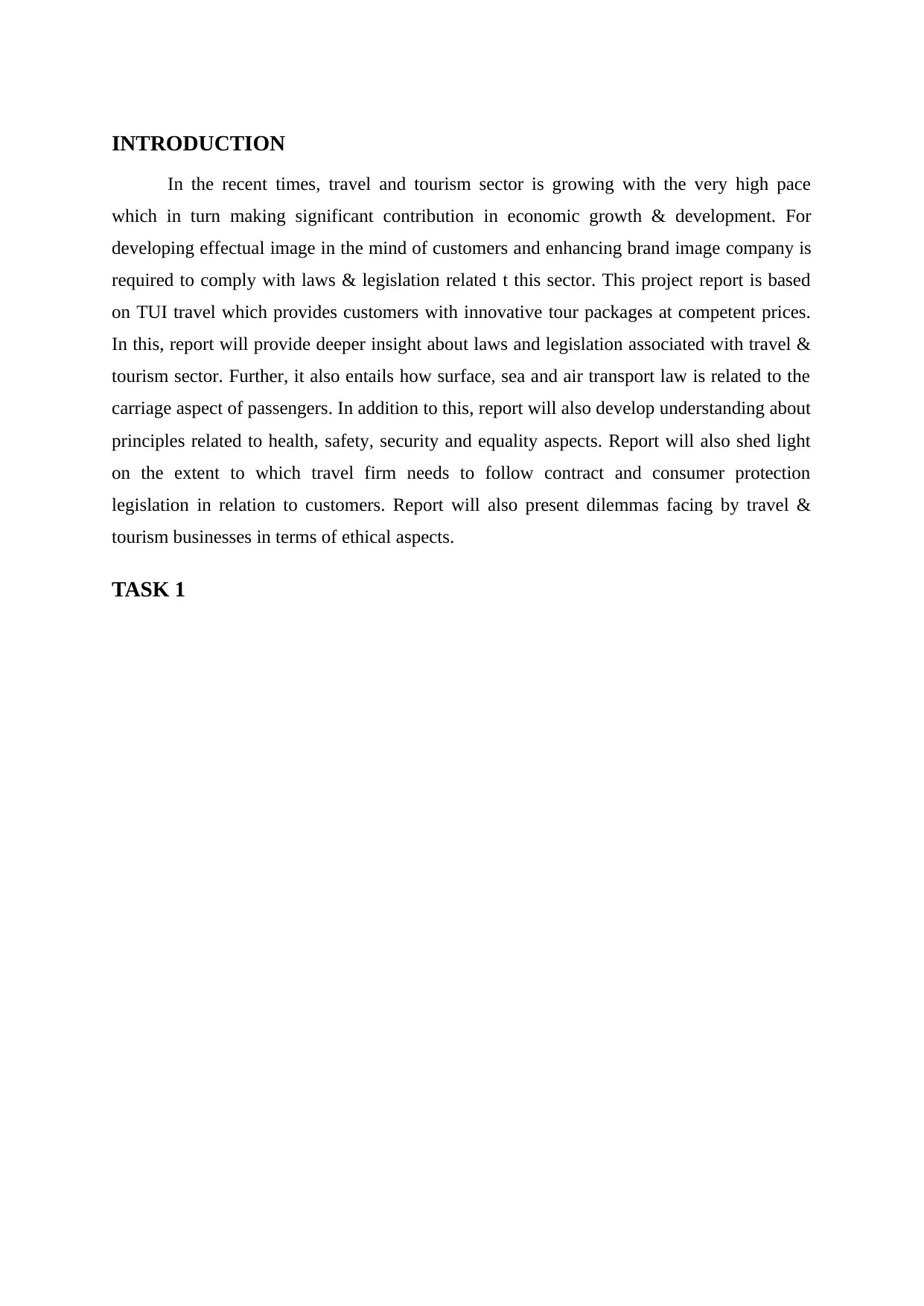
INTRODUCTION
In the recent times, travel and tourism sector is growing with the very high pace
which in turn making significant contribution in economic growth & development. For
developing effectual image in the mind of customers and enhancing brand image company is
required to comply with laws & legislation related t this sector. This project report is based
on TUI travel which provides customers with innovative tour packages at competent prices.
In this, report will provide deeper insight about laws and legislation associated with travel &
tourism sector. Further, it also entails how surface, sea and air transport law is related to the
carriage aspect of passengers. In addition to this, report will also develop understanding about
principles related to health, safety, security and equality aspects. Report will also shed light
on the extent to which travel firm needs to follow contract and consumer protection
legislation in relation to customers. Report will also present dilemmas facing by travel &
tourism businesses in terms of ethical aspects.
TASK 1
In the recent times, travel and tourism sector is growing with the very high pace
which in turn making significant contribution in economic growth & development. For
developing effectual image in the mind of customers and enhancing brand image company is
required to comply with laws & legislation related t this sector. This project report is based
on TUI travel which provides customers with innovative tour packages at competent prices.
In this, report will provide deeper insight about laws and legislation associated with travel &
tourism sector. Further, it also entails how surface, sea and air transport law is related to the
carriage aspect of passengers. In addition to this, report will also develop understanding about
principles related to health, safety, security and equality aspects. Report will also shed light
on the extent to which travel firm needs to follow contract and consumer protection
legislation in relation to customers. Report will also present dilemmas facing by travel &
tourism businesses in terms of ethical aspects.
TASK 1
⊘ This is a preview!⊘
Do you want full access?
Subscribe today to unlock all pages.

Trusted by 1+ million students worldwide
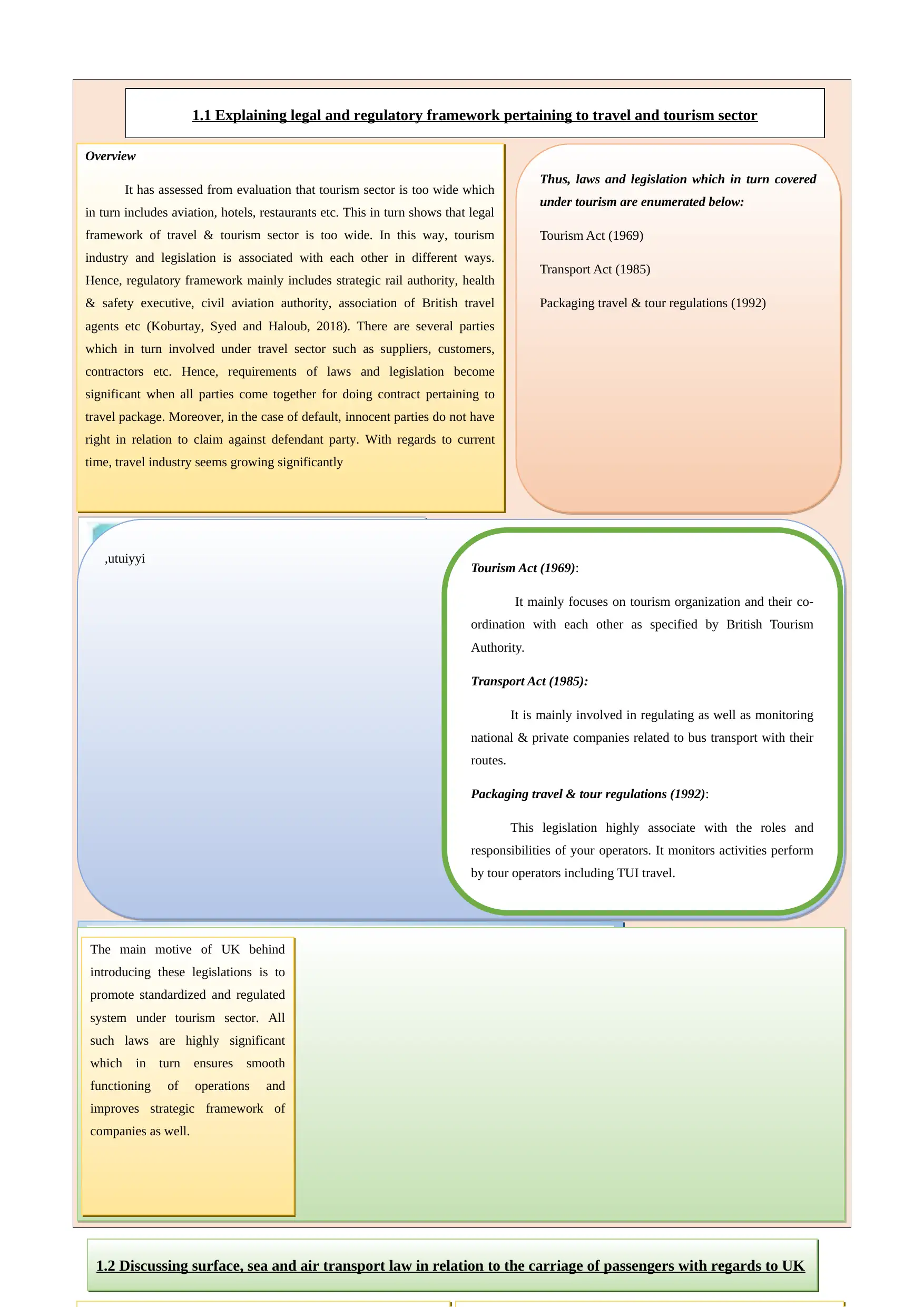
1.1 Explaining legal and regulatory framework pertaining to travel and tourism sector
Overview
It has assessed from evaluation that tourism sector is too wide which
in turn includes aviation, hotels, restaurants etc. This in turn shows that legal
framework of travel & tourism sector is too wide. In this way, tourism
industry and legislation is associated with each other in different ways.
Hence, regulatory framework mainly includes strategic rail authority, health
& safety executive, civil aviation authority, association of British travel
agents etc (Koburtay, Syed and Haloub, 2018). There are several parties
which in turn involved under travel sector such as suppliers, customers,
contractors etc. Hence, requirements of laws and legislation become
significant when all parties come together for doing contract pertaining to
travel package. Moreover, in the case of default, innocent parties do not have
right in relation to claim against defendant party. With regards to current
time, travel industry seems growing significantly
,utuiyyi
The main motive of UK behind
introducing these legislations is to
promote standardized and regulated
system under tourism sector. All
such laws are highly significant
which in turn ensures smooth
functioning of operations and
improves strategic framework of
companies as well.
Thus, laws and legislation which in turn covered
under tourism are enumerated below:
Tourism Act (1969)
Transport Act (1985)
Packaging travel & tour regulations (1992)
Tourism Act (1969):
It mainly focuses on tourism organization and their co-
ordination with each other as specified by British Tourism
Authority.
Transport Act (1985):
It is mainly involved in regulating as well as monitoring
national & private companies related to bus transport with their
routes.
Packaging travel & tour regulations (1992):
This legislation highly associate with the roles and
responsibilities of your operators. It monitors activities perform
by tour operators including TUI travel.
1.2 Discussing surface, sea and air transport law in relation to the carriage of passengers with regards to UK
Overview
It has assessed from evaluation that tourism sector is too wide which
in turn includes aviation, hotels, restaurants etc. This in turn shows that legal
framework of travel & tourism sector is too wide. In this way, tourism
industry and legislation is associated with each other in different ways.
Hence, regulatory framework mainly includes strategic rail authority, health
& safety executive, civil aviation authority, association of British travel
agents etc (Koburtay, Syed and Haloub, 2018). There are several parties
which in turn involved under travel sector such as suppliers, customers,
contractors etc. Hence, requirements of laws and legislation become
significant when all parties come together for doing contract pertaining to
travel package. Moreover, in the case of default, innocent parties do not have
right in relation to claim against defendant party. With regards to current
time, travel industry seems growing significantly
,utuiyyi
The main motive of UK behind
introducing these legislations is to
promote standardized and regulated
system under tourism sector. All
such laws are highly significant
which in turn ensures smooth
functioning of operations and
improves strategic framework of
companies as well.
Thus, laws and legislation which in turn covered
under tourism are enumerated below:
Tourism Act (1969)
Transport Act (1985)
Packaging travel & tour regulations (1992)
Tourism Act (1969):
It mainly focuses on tourism organization and their co-
ordination with each other as specified by British Tourism
Authority.
Transport Act (1985):
It is mainly involved in regulating as well as monitoring
national & private companies related to bus transport with their
routes.
Packaging travel & tour regulations (1992):
This legislation highly associate with the roles and
responsibilities of your operators. It monitors activities perform
by tour operators including TUI travel.
1.2 Discussing surface, sea and air transport law in relation to the carriage of passengers with regards to UK
Paraphrase This Document
Need a fresh take? Get an instant paraphrase of this document with our AI Paraphraser
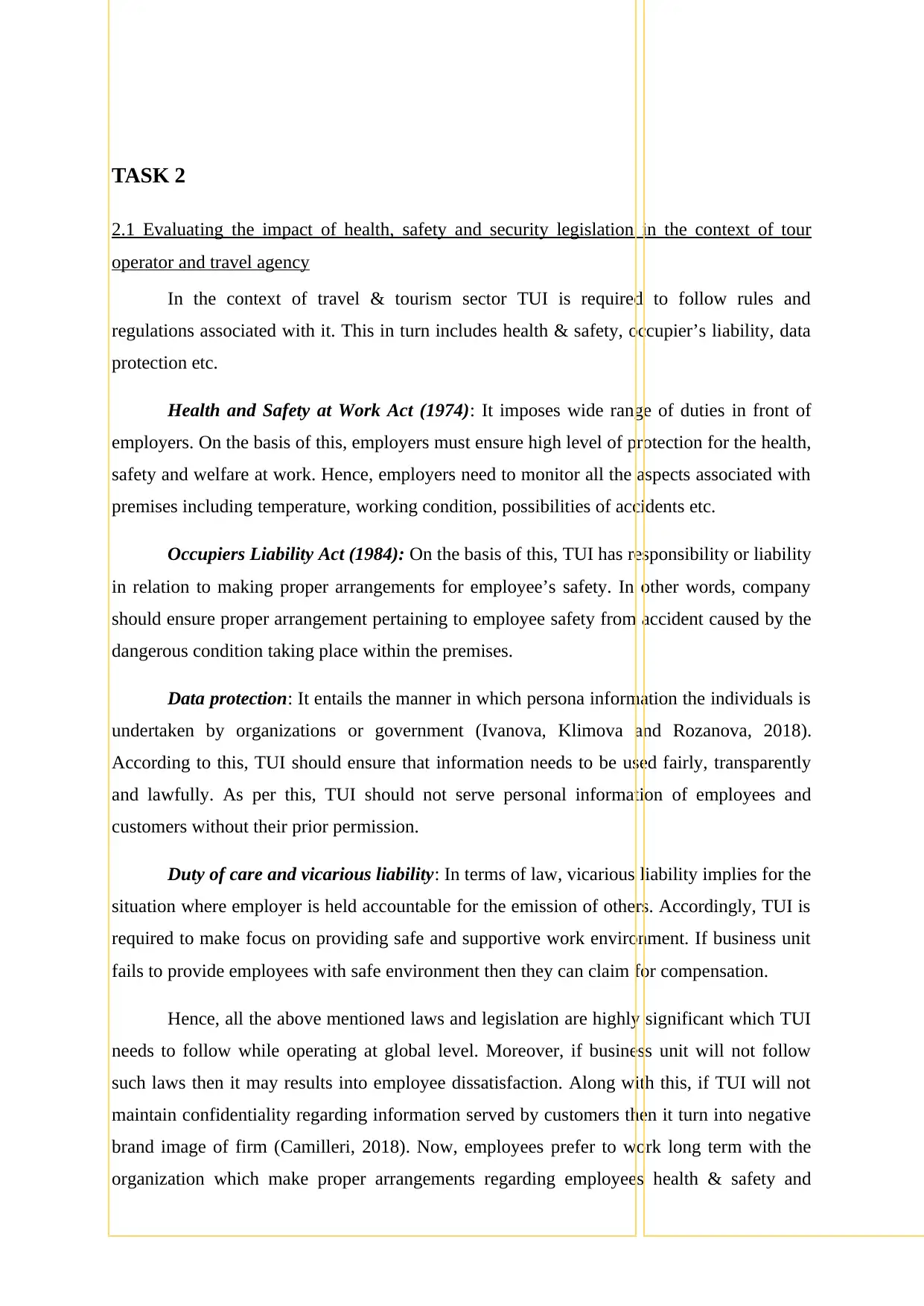
TASK 2
2.1 Evaluating the impact of health, safety and security legislation in the context of tour
operator and travel agency
In the context of travel & tourism sector TUI is required to follow rules and
regulations associated with it. This in turn includes health & safety, occupier’s liability, data
protection etc.
Health and Safety at Work Act (1974): It imposes wide range of duties in front of
employers. On the basis of this, employers must ensure high level of protection for the health,
safety and welfare at work. Hence, employers need to monitor all the aspects associated with
premises including temperature, working condition, possibilities of accidents etc.
Occupiers Liability Act (1984): On the basis of this, TUI has responsibility or liability
in relation to making proper arrangements for employee’s safety. In other words, company
should ensure proper arrangement pertaining to employee safety from accident caused by the
dangerous condition taking place within the premises.
Data protection: It entails the manner in which persona information the individuals is
undertaken by organizations or government (Ivanova, Klimova and Rozanova, 2018).
According to this, TUI should ensure that information needs to be used fairly, transparently
and lawfully. As per this, TUI should not serve personal information of employees and
customers without their prior permission.
Duty of care and vicarious liability: In terms of law, vicarious liability implies for the
situation where employer is held accountable for the emission of others. Accordingly, TUI is
required to make focus on providing safe and supportive work environment. If business unit
fails to provide employees with safe environment then they can claim for compensation.
Hence, all the above mentioned laws and legislation are highly significant which TUI
needs to follow while operating at global level. Moreover, if business unit will not follow
such laws then it may results into employee dissatisfaction. Along with this, if TUI will not
maintain confidentiality regarding information served by customers then it turn into negative
brand image of firm (Camilleri, 2018). Now, employees prefer to work long term with the
organization which make proper arrangements regarding employees health & safety and
2.1 Evaluating the impact of health, safety and security legislation in the context of tour
operator and travel agency
In the context of travel & tourism sector TUI is required to follow rules and
regulations associated with it. This in turn includes health & safety, occupier’s liability, data
protection etc.
Health and Safety at Work Act (1974): It imposes wide range of duties in front of
employers. On the basis of this, employers must ensure high level of protection for the health,
safety and welfare at work. Hence, employers need to monitor all the aspects associated with
premises including temperature, working condition, possibilities of accidents etc.
Occupiers Liability Act (1984): On the basis of this, TUI has responsibility or liability
in relation to making proper arrangements for employee’s safety. In other words, company
should ensure proper arrangement pertaining to employee safety from accident caused by the
dangerous condition taking place within the premises.
Data protection: It entails the manner in which persona information the individuals is
undertaken by organizations or government (Ivanova, Klimova and Rozanova, 2018).
According to this, TUI should ensure that information needs to be used fairly, transparently
and lawfully. As per this, TUI should not serve personal information of employees and
customers without their prior permission.
Duty of care and vicarious liability: In terms of law, vicarious liability implies for the
situation where employer is held accountable for the emission of others. Accordingly, TUI is
required to make focus on providing safe and supportive work environment. If business unit
fails to provide employees with safe environment then they can claim for compensation.
Hence, all the above mentioned laws and legislation are highly significant which TUI
needs to follow while operating at global level. Moreover, if business unit will not follow
such laws then it may results into employee dissatisfaction. Along with this, if TUI will not
maintain confidentiality regarding information served by customers then it turn into negative
brand image of firm (Camilleri, 2018). Now, employees prefer to work long term with the
organization which make proper arrangements regarding employees health & safety and
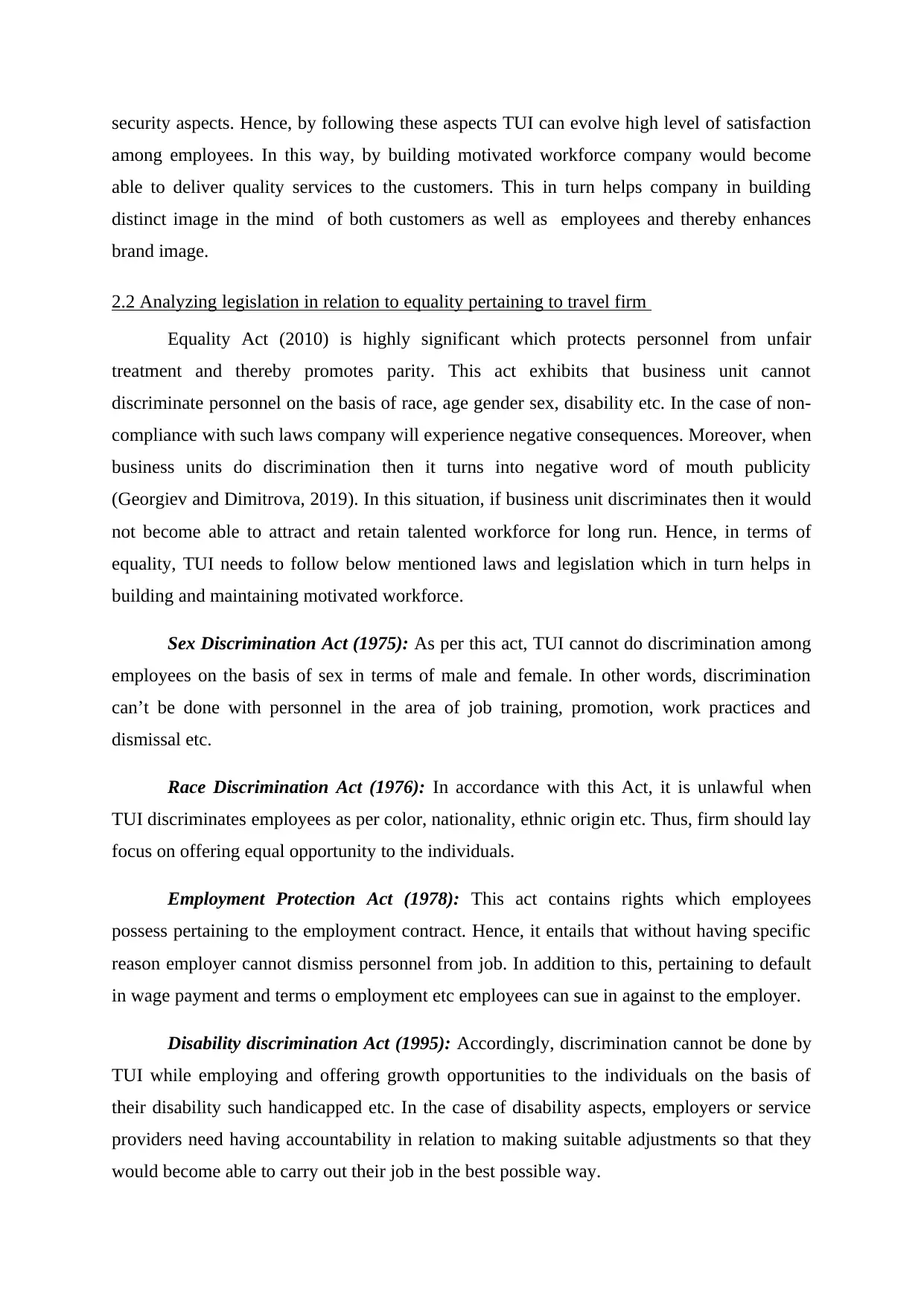
security aspects. Hence, by following these aspects TUI can evolve high level of satisfaction
among employees. In this way, by building motivated workforce company would become
able to deliver quality services to the customers. This in turn helps company in building
distinct image in the mind of both customers as well as employees and thereby enhances
brand image.
2.2 Analyzing legislation in relation to equality pertaining to travel firm
Equality Act (2010) is highly significant which protects personnel from unfair
treatment and thereby promotes parity. This act exhibits that business unit cannot
discriminate personnel on the basis of race, age gender sex, disability etc. In the case of non-
compliance with such laws company will experience negative consequences. Moreover, when
business units do discrimination then it turns into negative word of mouth publicity
(Georgiev and Dimitrova, 2019). In this situation, if business unit discriminates then it would
not become able to attract and retain talented workforce for long run. Hence, in terms of
equality, TUI needs to follow below mentioned laws and legislation which in turn helps in
building and maintaining motivated workforce.
Sex Discrimination Act (1975): As per this act, TUI cannot do discrimination among
employees on the basis of sex in terms of male and female. In other words, discrimination
can’t be done with personnel in the area of job training, promotion, work practices and
dismissal etc.
Race Discrimination Act (1976): In accordance with this Act, it is unlawful when
TUI discriminates employees as per color, nationality, ethnic origin etc. Thus, firm should lay
focus on offering equal opportunity to the individuals.
Employment Protection Act (1978): This act contains rights which employees
possess pertaining to the employment contract. Hence, it entails that without having specific
reason employer cannot dismiss personnel from job. In addition to this, pertaining to default
in wage payment and terms o employment etc employees can sue in against to the employer.
Disability discrimination Act (1995): Accordingly, discrimination cannot be done by
TUI while employing and offering growth opportunities to the individuals on the basis of
their disability such handicapped etc. In the case of disability aspects, employers or service
providers need having accountability in relation to making suitable adjustments so that they
would become able to carry out their job in the best possible way.
among employees. In this way, by building motivated workforce company would become
able to deliver quality services to the customers. This in turn helps company in building
distinct image in the mind of both customers as well as employees and thereby enhances
brand image.
2.2 Analyzing legislation in relation to equality pertaining to travel firm
Equality Act (2010) is highly significant which protects personnel from unfair
treatment and thereby promotes parity. This act exhibits that business unit cannot
discriminate personnel on the basis of race, age gender sex, disability etc. In the case of non-
compliance with such laws company will experience negative consequences. Moreover, when
business units do discrimination then it turns into negative word of mouth publicity
(Georgiev and Dimitrova, 2019). In this situation, if business unit discriminates then it would
not become able to attract and retain talented workforce for long run. Hence, in terms of
equality, TUI needs to follow below mentioned laws and legislation which in turn helps in
building and maintaining motivated workforce.
Sex Discrimination Act (1975): As per this act, TUI cannot do discrimination among
employees on the basis of sex in terms of male and female. In other words, discrimination
can’t be done with personnel in the area of job training, promotion, work practices and
dismissal etc.
Race Discrimination Act (1976): In accordance with this Act, it is unlawful when
TUI discriminates employees as per color, nationality, ethnic origin etc. Thus, firm should lay
focus on offering equal opportunity to the individuals.
Employment Protection Act (1978): This act contains rights which employees
possess pertaining to the employment contract. Hence, it entails that without having specific
reason employer cannot dismiss personnel from job. In addition to this, pertaining to default
in wage payment and terms o employment etc employees can sue in against to the employer.
Disability discrimination Act (1995): Accordingly, discrimination cannot be done by
TUI while employing and offering growth opportunities to the individuals on the basis of
their disability such handicapped etc. In the case of disability aspects, employers or service
providers need having accountability in relation to making suitable adjustments so that they
would become able to carry out their job in the best possible way.
⊘ This is a preview!⊘
Do you want full access?
Subscribe today to unlock all pages.

Trusted by 1+ million students worldwide
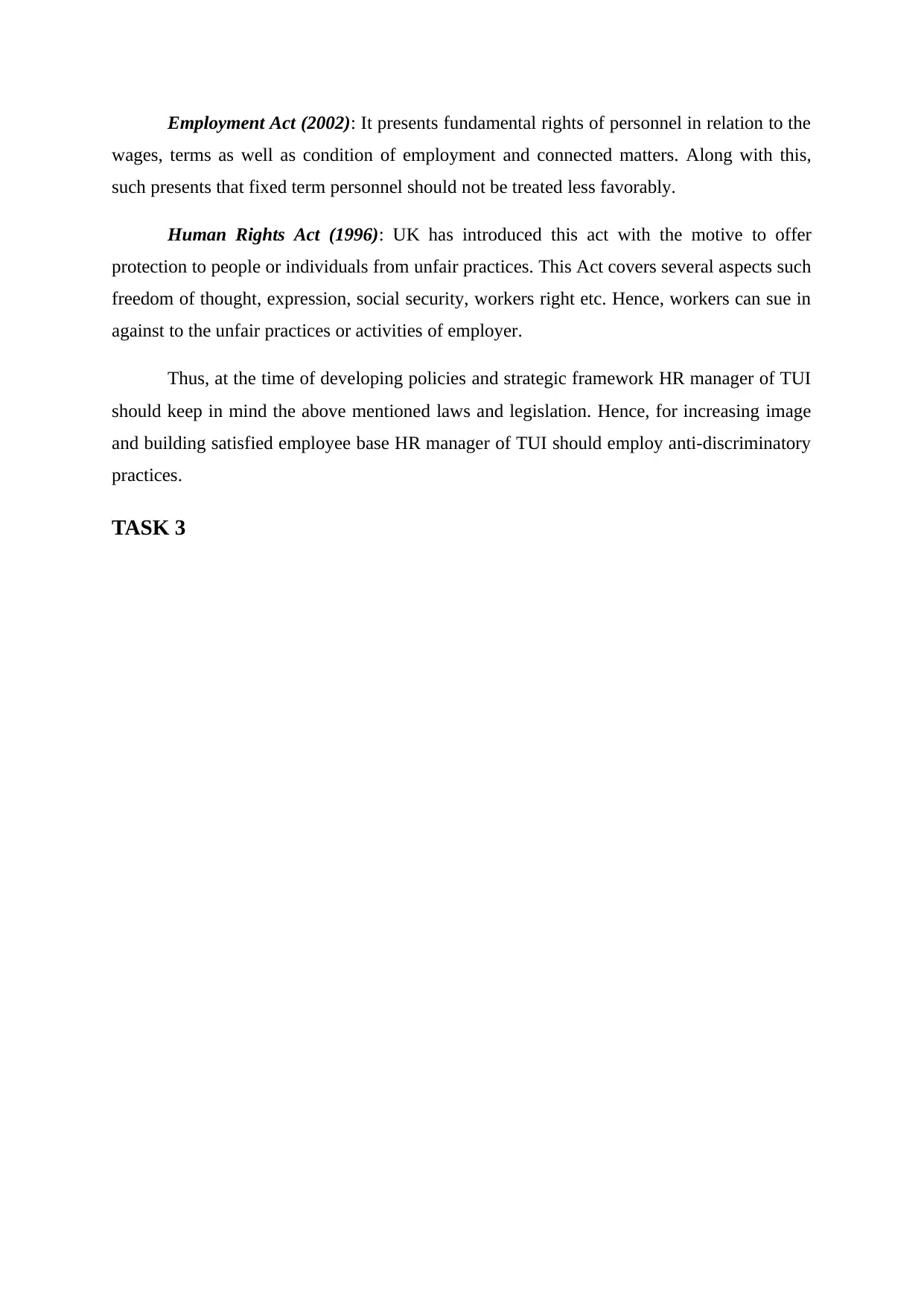
Employment Act (2002): It presents fundamental rights of personnel in relation to the
wages, terms as well as condition of employment and connected matters. Along with this,
such presents that fixed term personnel should not be treated less favorably.
Human Rights Act (1996): UK has introduced this act with the motive to offer
protection to people or individuals from unfair practices. This Act covers several aspects such
freedom of thought, expression, social security, workers right etc. Hence, workers can sue in
against to the unfair practices or activities of employer.
Thus, at the time of developing policies and strategic framework HR manager of TUI
should keep in mind the above mentioned laws and legislation. Hence, for increasing image
and building satisfied employee base HR manager of TUI should employ anti-discriminatory
practices.
TASK 3
wages, terms as well as condition of employment and connected matters. Along with this,
such presents that fixed term personnel should not be treated less favorably.
Human Rights Act (1996): UK has introduced this act with the motive to offer
protection to people or individuals from unfair practices. This Act covers several aspects such
freedom of thought, expression, social security, workers right etc. Hence, workers can sue in
against to the unfair practices or activities of employer.
Thus, at the time of developing policies and strategic framework HR manager of TUI
should keep in mind the above mentioned laws and legislation. Hence, for increasing image
and building satisfied employee base HR manager of TUI should employ anti-discriminatory
practices.
TASK 3
Paraphrase This Document
Need a fresh take? Get an instant paraphrase of this document with our AI Paraphraser
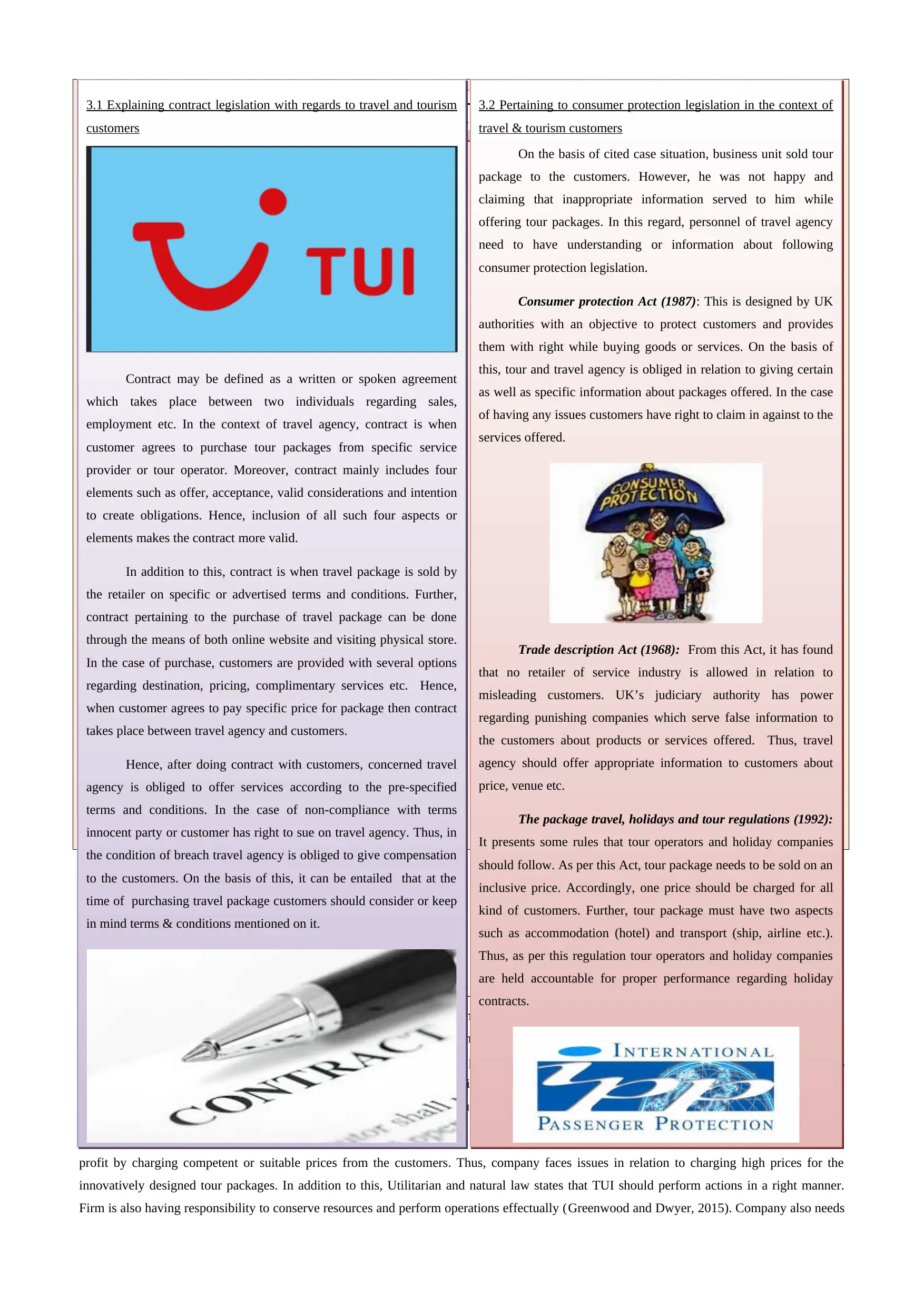
TASK 4
4.1 Analyzing ethical dilemmas facing by travel & tourism sector
There are several issues or dilemmas which in turn facing by TUI travel with regards to fulfilling ethical aspects. With the motive to
attract customers usually travel firm designs and presents tour packages in an innovative manner. Moreover, the main motive of firm is to attract
more customers towards the services offered. In this regard, TUI faces ethical dilemma with regards to advertising. In other words, business unit
has accountability to present accurate information while advertising tour packages (Ethical Issues and CSR in the Travel and Tourism Industry,
2019). Along with this, now business unit is accountable to perform business operations and functions in a sustainable manner. For complying
with ethical aspects and influencing customers company needs to carry out activities in an eco-friendly way.
Further, TUI also faces ethical issues while setting prices for the services offered. Moreover, the main motive of firm is to attain high
profit by charging competent or suitable prices from the customers. Thus, company faces issues in relation to charging high prices for the
innovatively designed tour packages. In addition to this, Utilitarian and natural law states that TUI should perform actions in a right manner.
Firm is also having responsibility to conserve resources and perform operations effectually (Greenwood and Dwyer, 2015). Company also needs
Legislation and Ethics in Travel and Tourism Sector3.1 Explaining contract legislation with regards to travel and tourism
customers
Contract may be defined as a written or spoken agreement
which takes place between two individuals regarding sales,
employment etc. In the context of travel agency, contract is when
customer agrees to purchase tour packages from specific service
provider or tour operator. Moreover, contract mainly includes four
elements such as offer, acceptance, valid considerations and intention
to create obligations. Hence, inclusion of all such four aspects or
elements makes the contract more valid.
In addition to this, contract is when travel package is sold by
the retailer on specific or advertised terms and conditions. Further,
contract pertaining to the purchase of travel package can be done
through the means of both online website and visiting physical store.
In the case of purchase, customers are provided with several options
regarding destination, pricing, complimentary services etc. Hence,
when customer agrees to pay specific price for package then contract
takes place between travel agency and customers.
Hence, after doing contract with customers, concerned travel
agency is obliged to offer services according to the pre-specified
terms and conditions. In the case of non-compliance with terms
innocent party or customer has right to sue on travel agency. Thus, in
the condition of breach travel agency is obliged to give compensation
to the customers. On the basis of this, it can be entailed that at the
time of purchasing travel package customers should consider or keep
in mind terms & conditions mentioned on it.
3.2 Pertaining to consumer protection legislation in the context of
travel & tourism customers
On the basis of cited case situation, business unit sold tour
package to the customers. However, he was not happy and
claiming that inappropriate information served to him while
offering tour packages. In this regard, personnel of travel agency
need to have understanding or information about following
consumer protection legislation.
Consumer protection Act (1987): This is designed by UK
authorities with an objective to protect customers and provides
them with right while buying goods or services. On the basis of
this, tour and travel agency is obliged in relation to giving certain
as well as specific information about packages offered. In the case
of having any issues customers have right to claim in against to the
services offered.
Trade description Act (1968): From this Act, it has found
that no retailer of service industry is allowed in relation to
misleading customers. UK’s judiciary authority has power
regarding punishing companies which serve false information to
the customers about products or services offered. Thus, travel
agency should offer appropriate information to customers about
price, venue etc.
The package travel, holidays and tour regulations (1992):
It presents some rules that tour operators and holiday companies
should follow. As per this Act, tour package needs to be sold on an
inclusive price. Accordingly, one price should be charged for all
kind of customers. Further, tour package must have two aspects
such as accommodation (hotel) and transport (ship, airline etc.).
Thus, as per this regulation tour operators and holiday companies
are held accountable for proper performance regarding holiday
contracts.
4.1 Analyzing ethical dilemmas facing by travel & tourism sector
There are several issues or dilemmas which in turn facing by TUI travel with regards to fulfilling ethical aspects. With the motive to
attract customers usually travel firm designs and presents tour packages in an innovative manner. Moreover, the main motive of firm is to attract
more customers towards the services offered. In this regard, TUI faces ethical dilemma with regards to advertising. In other words, business unit
has accountability to present accurate information while advertising tour packages (Ethical Issues and CSR in the Travel and Tourism Industry,
2019). Along with this, now business unit is accountable to perform business operations and functions in a sustainable manner. For complying
with ethical aspects and influencing customers company needs to carry out activities in an eco-friendly way.
Further, TUI also faces ethical issues while setting prices for the services offered. Moreover, the main motive of firm is to attain high
profit by charging competent or suitable prices from the customers. Thus, company faces issues in relation to charging high prices for the
innovatively designed tour packages. In addition to this, Utilitarian and natural law states that TUI should perform actions in a right manner.
Firm is also having responsibility to conserve resources and perform operations effectually (Greenwood and Dwyer, 2015). Company also needs
Legislation and Ethics in Travel and Tourism Sector3.1 Explaining contract legislation with regards to travel and tourism
customers
Contract may be defined as a written or spoken agreement
which takes place between two individuals regarding sales,
employment etc. In the context of travel agency, contract is when
customer agrees to purchase tour packages from specific service
provider or tour operator. Moreover, contract mainly includes four
elements such as offer, acceptance, valid considerations and intention
to create obligations. Hence, inclusion of all such four aspects or
elements makes the contract more valid.
In addition to this, contract is when travel package is sold by
the retailer on specific or advertised terms and conditions. Further,
contract pertaining to the purchase of travel package can be done
through the means of both online website and visiting physical store.
In the case of purchase, customers are provided with several options
regarding destination, pricing, complimentary services etc. Hence,
when customer agrees to pay specific price for package then contract
takes place between travel agency and customers.
Hence, after doing contract with customers, concerned travel
agency is obliged to offer services according to the pre-specified
terms and conditions. In the case of non-compliance with terms
innocent party or customer has right to sue on travel agency. Thus, in
the condition of breach travel agency is obliged to give compensation
to the customers. On the basis of this, it can be entailed that at the
time of purchasing travel package customers should consider or keep
in mind terms & conditions mentioned on it.
3.2 Pertaining to consumer protection legislation in the context of
travel & tourism customers
On the basis of cited case situation, business unit sold tour
package to the customers. However, he was not happy and
claiming that inappropriate information served to him while
offering tour packages. In this regard, personnel of travel agency
need to have understanding or information about following
consumer protection legislation.
Consumer protection Act (1987): This is designed by UK
authorities with an objective to protect customers and provides
them with right while buying goods or services. On the basis of
this, tour and travel agency is obliged in relation to giving certain
as well as specific information about packages offered. In the case
of having any issues customers have right to claim in against to the
services offered.
Trade description Act (1968): From this Act, it has found
that no retailer of service industry is allowed in relation to
misleading customers. UK’s judiciary authority has power
regarding punishing companies which serve false information to
the customers about products or services offered. Thus, travel
agency should offer appropriate information to customers about
price, venue etc.
The package travel, holidays and tour regulations (1992):
It presents some rules that tour operators and holiday companies
should follow. As per this Act, tour package needs to be sold on an
inclusive price. Accordingly, one price should be charged for all
kind of customers. Further, tour package must have two aspects
such as accommodation (hotel) and transport (ship, airline etc.).
Thus, as per this regulation tour operators and holiday companies
are held accountable for proper performance regarding holiday
contracts.
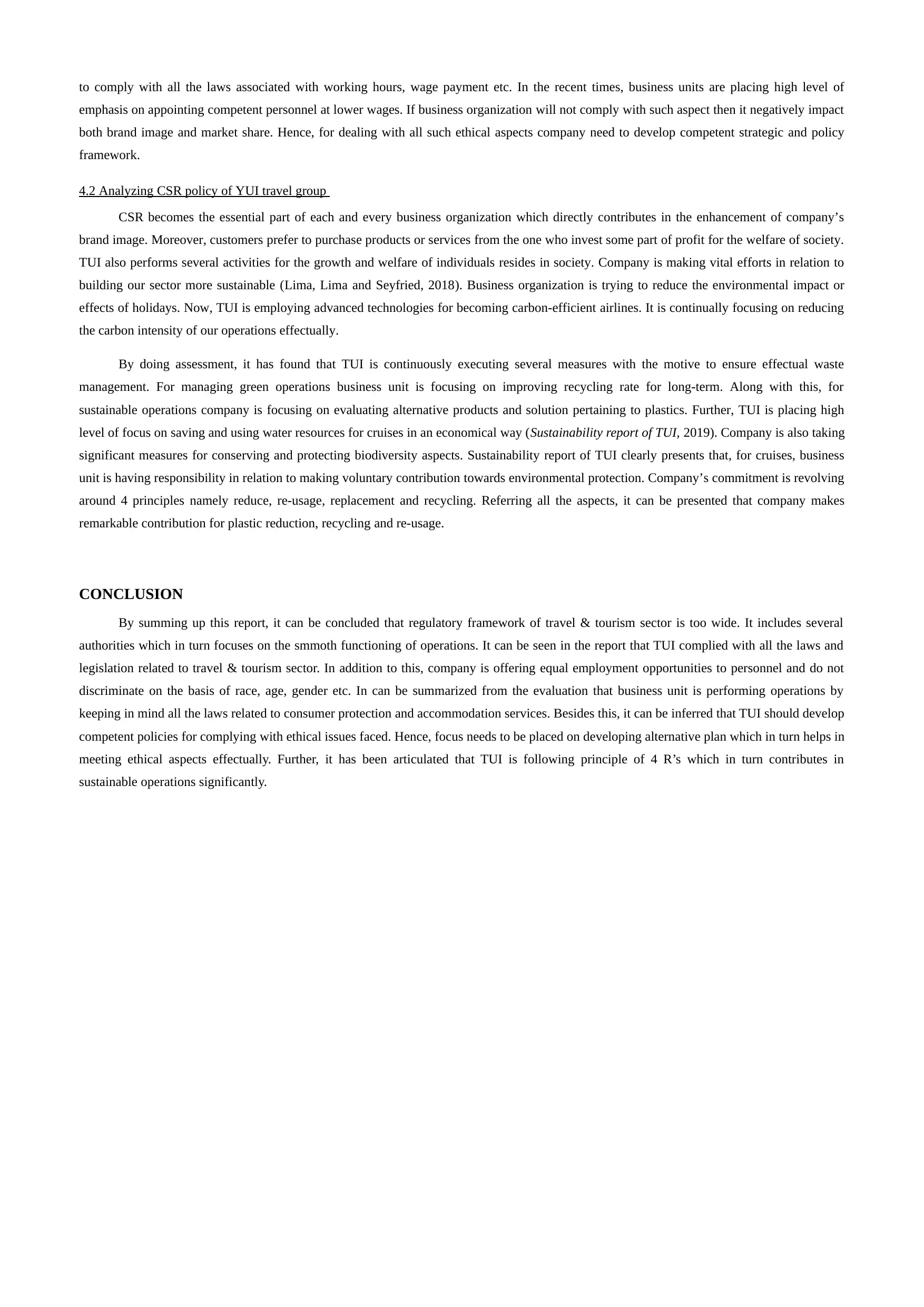
to comply with all the laws associated with working hours, wage payment etc. In the recent times, business units are placing high level of
emphasis on appointing competent personnel at lower wages. If business organization will not comply with such aspect then it negatively impact
both brand image and market share. Hence, for dealing with all such ethical aspects company need to develop competent strategic and policy
framework.
4.2 Analyzing CSR policy of YUI travel group
CSR becomes the essential part of each and every business organization which directly contributes in the enhancement of company’s
brand image. Moreover, customers prefer to purchase products or services from the one who invest some part of profit for the welfare of society.
TUI also performs several activities for the growth and welfare of individuals resides in society. Company is making vital efforts in relation to
building our sector more sustainable (Lima, Lima and Seyfried, 2018). Business organization is trying to reduce the environmental impact or
effects of holidays. Now, TUI is employing advanced technologies for becoming carbon-efficient airlines. It is continually focusing on reducing
the carbon intensity of our operations effectually.
By doing assessment, it has found that TUI is continuously executing several measures with the motive to ensure effectual waste
management. For managing green operations business unit is focusing on improving recycling rate for long-term. Along with this, for
sustainable operations company is focusing on evaluating alternative products and solution pertaining to plastics. Further, TUI is placing high
level of focus on saving and using water resources for cruises in an economical way (Sustainability report of TUI, 2019). Company is also taking
significant measures for conserving and protecting biodiversity aspects. Sustainability report of TUI clearly presents that, for cruises, business
unit is having responsibility in relation to making voluntary contribution towards environmental protection. Company’s commitment is revolving
around 4 principles namely reduce, re-usage, replacement and recycling. Referring all the aspects, it can be presented that company makes
remarkable contribution for plastic reduction, recycling and re-usage.
CONCLUSION
By summing up this report, it can be concluded that regulatory framework of travel & tourism sector is too wide. It includes several
authorities which in turn focuses on the smmoth functioning of operations. It can be seen in the report that TUI complied with all the laws and
legislation related to travel & tourism sector. In addition to this, company is offering equal employment opportunities to personnel and do not
discriminate on the basis of race, age, gender etc. In can be summarized from the evaluation that business unit is performing operations by
keeping in mind all the laws related to consumer protection and accommodation services. Besides this, it can be inferred that TUI should develop
competent policies for complying with ethical issues faced. Hence, focus needs to be placed on developing alternative plan which in turn helps in
meeting ethical aspects effectually. Further, it has been articulated that TUI is following principle of 4 R’s which in turn contributes in
sustainable operations significantly.
emphasis on appointing competent personnel at lower wages. If business organization will not comply with such aspect then it negatively impact
both brand image and market share. Hence, for dealing with all such ethical aspects company need to develop competent strategic and policy
framework.
4.2 Analyzing CSR policy of YUI travel group
CSR becomes the essential part of each and every business organization which directly contributes in the enhancement of company’s
brand image. Moreover, customers prefer to purchase products or services from the one who invest some part of profit for the welfare of society.
TUI also performs several activities for the growth and welfare of individuals resides in society. Company is making vital efforts in relation to
building our sector more sustainable (Lima, Lima and Seyfried, 2018). Business organization is trying to reduce the environmental impact or
effects of holidays. Now, TUI is employing advanced technologies for becoming carbon-efficient airlines. It is continually focusing on reducing
the carbon intensity of our operations effectually.
By doing assessment, it has found that TUI is continuously executing several measures with the motive to ensure effectual waste
management. For managing green operations business unit is focusing on improving recycling rate for long-term. Along with this, for
sustainable operations company is focusing on evaluating alternative products and solution pertaining to plastics. Further, TUI is placing high
level of focus on saving and using water resources for cruises in an economical way (Sustainability report of TUI, 2019). Company is also taking
significant measures for conserving and protecting biodiversity aspects. Sustainability report of TUI clearly presents that, for cruises, business
unit is having responsibility in relation to making voluntary contribution towards environmental protection. Company’s commitment is revolving
around 4 principles namely reduce, re-usage, replacement and recycling. Referring all the aspects, it can be presented that company makes
remarkable contribution for plastic reduction, recycling and re-usage.
CONCLUSION
By summing up this report, it can be concluded that regulatory framework of travel & tourism sector is too wide. It includes several
authorities which in turn focuses on the smmoth functioning of operations. It can be seen in the report that TUI complied with all the laws and
legislation related to travel & tourism sector. In addition to this, company is offering equal employment opportunities to personnel and do not
discriminate on the basis of race, age, gender etc. In can be summarized from the evaluation that business unit is performing operations by
keeping in mind all the laws related to consumer protection and accommodation services. Besides this, it can be inferred that TUI should develop
competent policies for complying with ethical issues faced. Hence, focus needs to be placed on developing alternative plan which in turn helps in
meeting ethical aspects effectually. Further, it has been articulated that TUI is following principle of 4 R’s which in turn contributes in
sustainable operations significantly.
⊘ This is a preview!⊘
Do you want full access?
Subscribe today to unlock all pages.

Trusted by 1+ million students worldwide
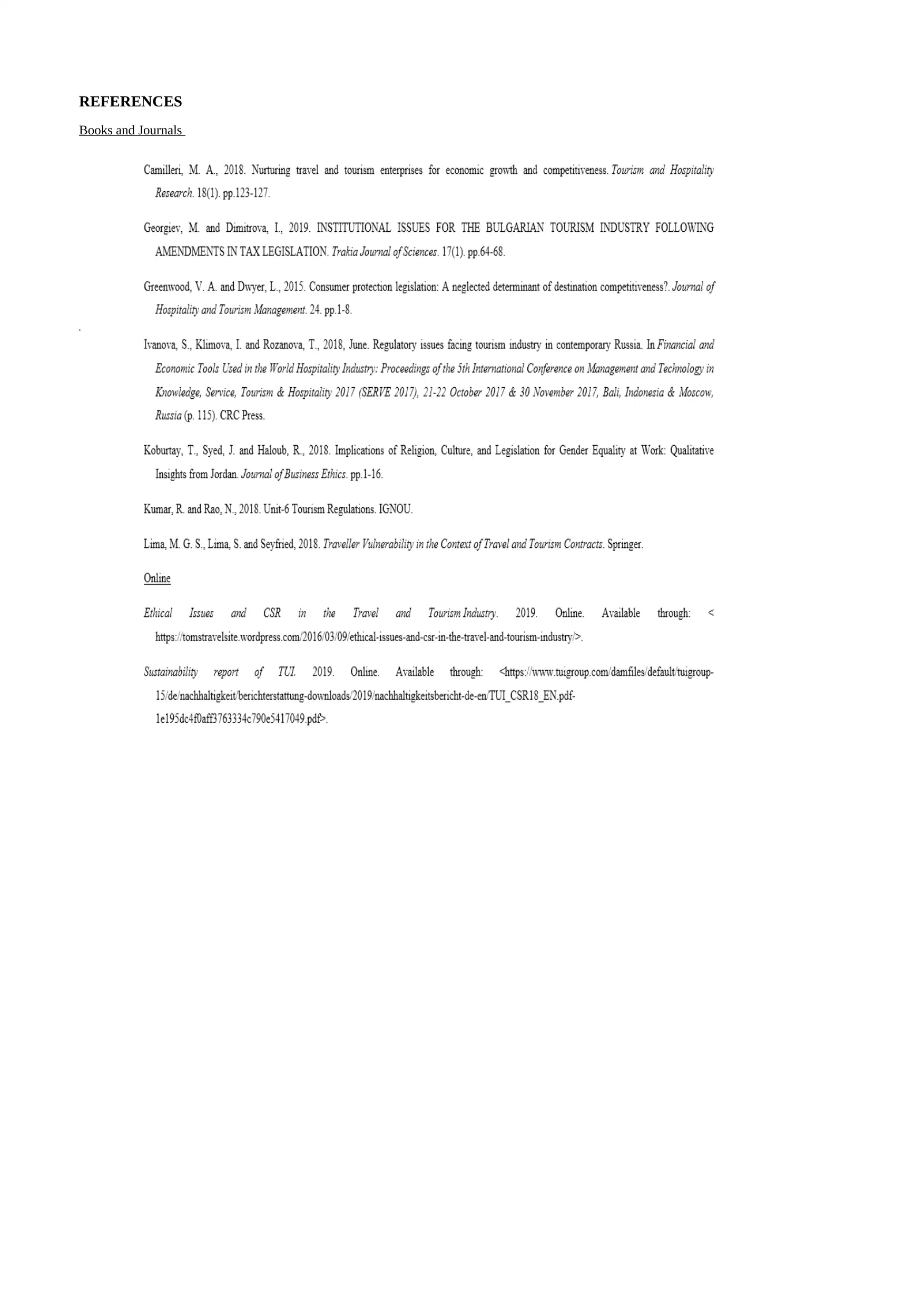
REFERENCES
Books and Journals
Books and Journals
1 out of 10
Related Documents
Your All-in-One AI-Powered Toolkit for Academic Success.
+13062052269
info@desklib.com
Available 24*7 on WhatsApp / Email
![[object Object]](/_next/static/media/star-bottom.7253800d.svg)
Unlock your academic potential
Copyright © 2020–2026 A2Z Services. All Rights Reserved. Developed and managed by ZUCOL.





